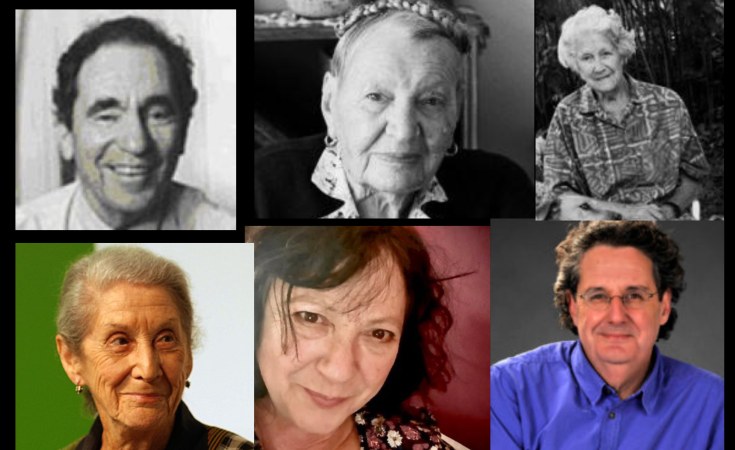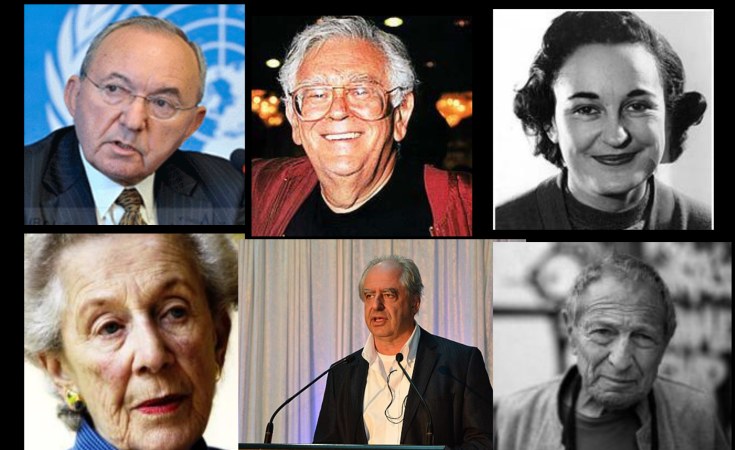Over four decades ago, South African Judge Richard Goldstone made legal history by refusing to implement a central apartheid law that prescribed where black South Africans could live.
One of a group of judges, mostly Jewish, who accepted appointment by the white government to the bench and used the opportunity to try to protect people of color, Goldstone later served as chief prosecutor for the United Nations International Criminal Tribunals for the former Yugoslavia and Rwanda and as a judge of South Africa's Constitutional Court, appointed by Nelson Mandela in 1994.
While some regarded working within apartheid structures, as Goldstone did, as unacceptable, the final report of South Africa's Truth and Reconciliation Commission, led by Nobel Peace Prize laureate Anglican Archbishop Desmond Tutu, said that Goldstone and a few other influential colleagues had kept the ideal of constitutional democracy alive and that their "alleviation of suffering" far outweighed their participation in the system.
Another who worked within the system before it was dismantled was Helen Suzman, for years was the only anti-apartheid member of parliament. She used her status to promote women's rights and to publicize and ameliorate the brutal prison conditions for black detainees, using her parliamentary prerogative to visit political prisoners, including Nelson Mandela on Robban Island.
Last November, when Concerned Jews of South Africa launched an open letter, which has been signed by over 750 prominent people in broadcasting, journalism, and the arts, as well as students and community activists, they were standing on the shoulders of Goldstone and Suzman – and of the generations before them. "We must hold to account those responsible for violence against civilians – whether perpetrated in Gaza, the West Bank, or Israel. We do so not in spite of our Jewish identity, but because of it", the letter says.
Reporter and editor Anton Harber and his partner, acclaimed filmmaker Harriet Gavshon, were among the leaders of the open letter calling for immediate ceasefire in Gaza. "We need to strengthen the voices of peace which are being drowned out by the extremists," said Harber, explaining his signature. "We need to push back the war-mongers."
Ashleigh Fischoff is a young Jewish researcher at the Institute for Poverty, Land and Agrarian Studies at the University of the Western Cape, an institution established by the former white government as a school for mixed-race South Africans. "The South African voice, and particularly the South African Jewish communal voice, is an historically and presently important source of solidarity for the Palestinian struggle", said Fischoff, about her backing of the letter.
In the name of the father – and mother
Several of the signers are continuing a family tradition. World-renowned artist William Kentridge, whose works have sold for over $1.5 million, is a son of lawyer Felicia Geffer and Sir Sidney Kentridge, a South African lawyer credited with helping to dismantle apartheid – defending Mandela and others, including in the infamous Treason Trial, before moving to the UK, where he was knighted for his international human rights work. Each year, the South African bar bestows the Sydney and Felicia Kentridge Award for service to the law in Southern Africa.
Documentarian and filmmaker Brenda Goldblatt is the daughter of David Goldblatt, a photographer whose work depicting apartheid's victims through the reality of their lives, rather than through protests and news events, appeared widely in such publications as National Geographic. She co-produced 'Goldblatt', a film about her father. Her work also includes co-authorship of the film Songolo: Voices of Change'.
Another Jewish artist who used 'soft power' to challenge apartheid was Nadine Gordimer, the 1991 recipient of the Nobel Prize for Literature. Her writings quietly insisted on the common humanity of all South Africans and showed the subversive power of individual acts of rebellion.
Among the most influential Jewish South Africans establishing an anti-apartheid legacy were Joe Slovo and his journalist wife Ruth First. Slovo was detained under the Treason Act but escaped into exile, where he became a commander in the military wing of the African National Congress, uMkhonto we Sizwe, which means Spear of the Nation. First was killed by a South African parcel bomb in 1982 while teaching at university in Mozambique.
Returning to South Africa to help negotiate majority rule, Slovo was credited with significant breakthroughs. Traveling South Africa to rally support for the constitutional process, he pushed back at those who rejected compromise with white supremacists. In a rousing speech in a black township of Cape Town in April 1990, published by Inside South Africa [Volume 1 No. 2], Slovo said, "Some armchair revolutionaries with mythical armies scream 'treason' at the very mention of the word 'dialogue…. It's precisely because we have fought and not just talked that the other side is forced to even begin to contemplate a political solution." Slovo was appointed Minister of Housing in Mandela's first cabinet, and Mandela was at his bedside when he died of cancer.

Teacher, anti-apartheid activist and feminist Helen Joseph was one of six Jewish women who were accused in the treason trials in 1956. She was a founder of the Congress of Democrats, a white group allied with the ANC, and worked for the Garment Workers Union. Like other women accused, she was acquitted; Judge Goldstone once speculated that the government intended to execute those convicted, including Mandela, but they feared losing public support if they executed women. [Ultimately, the white government feared tougher international policies, and sentenced Mandela to life imprisonment instead.] Joseph was the first person to be placed under house arrest, and she survived several assassination attempts while in confinement. "On behalf of the South African people", the ANC gave her its highest award, Isitwalandwe/Seaparankwe.
There's a story about trade unionist Ray Alexander, fleeing persecution in Latvia, that she had South African dockworkers organized before her luggage had been unloaded in November 1929. She helped build the Food and Canning Workers Union as a national multi-ethnic force against apartheid and helped lead the multi-racial Federation of South African Women. She and her husband, Jack Simon, were the first whites to be accepted as members of the African National Congress in 1967. He taught in ANC schools in exile in Angola while she continued underground work, and together they wrote the classic history Class and Colour in South Africa: 1850-1950.Alexander was the third woman to be awarded Isitwalandwe/Seaparankwe.
Doing good is the best revenge.
One of the same set of parcel bombs in Mozambique that killed Ruth First ripped off the right arm and blinded one eye of a younger-generation jurist Albie Sachs, whose parents escaped to South Africa from Lithuania's persecution of Jews. Both parents were activists, and his father was general secretary of the Garment Workers Union, where he influenced Helen Joseph. When the ANC was unbanned, Sachs returned from exile and became an architect of the democracy constitution, and was named by Mandela to the independent Constitutional Court. One of his books, The Soft Vengeance of a Freedom Fighter, posits that working towards universal human rights is the best reward for a life of struggle. Now retired, Sachs has remained active in social causes and philanthropies.
Most white South Africans during apartheid, including Jewish ones, were largely silent in the face of black suffering, even though many disapproved. It is impossible to know the percentage who sympathized with government policies or how many went along to get along.
What seems true is that Jewish South Africans were over-represented among those whites who risked most to fight apartheid. And a sizeable number of their children and heirs see troubling parallels in current Israeli policies towards Palestinians and the white supremacy they or their parents and grandparents experienced.
Benjamin Pogrund, the former editor of the anti-apartheid newspaper in Johannesburg, the Rand Daily Mail, retired to Israel, where he has long defended Israel against charges that it mimics apartheid. But in a column for the Israeli newspaper Haaretz on 10 August last year, he wrote: "I am now witnessing the apartheid with which I grew up in South Africa. The Israeli government's fascist, racist power-grab is the gift Israel's enemies have long awaited."
Concerned Jewish South Africans condemn the Hamas attack on Israel - and argue that "the current cycle of violence is rooted in decades of dispossession…We also acknowledge that this conflict is fundamentally asymmetrical in nature; between a powerful military force and a stateless people who have resisted the denial of their basic human rights for generations." The only lasting solution "to ensure genuine safety for all', they write, is one "that secures the equal rights and dignity of all Israelis and Palestinians."
In that declaration, they reaffirm the Jewish principle that all life is equally valuable that their South African forebears worked so hard to achieve.
Tami Hultman did research on U.S. companies supporting apartheid with her husband Reed Kramer while living in South Africa before being deported. They knew most of the people mentioned in this article – some in South Africa, both before and after white rule ended, and they met others in Zambia and Mozambique.


